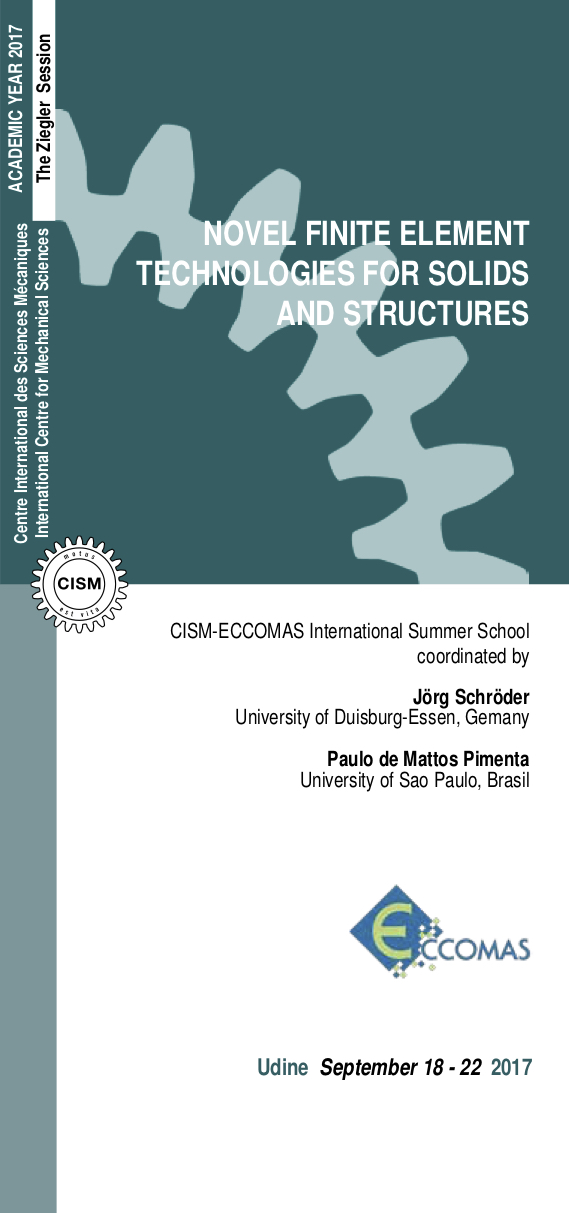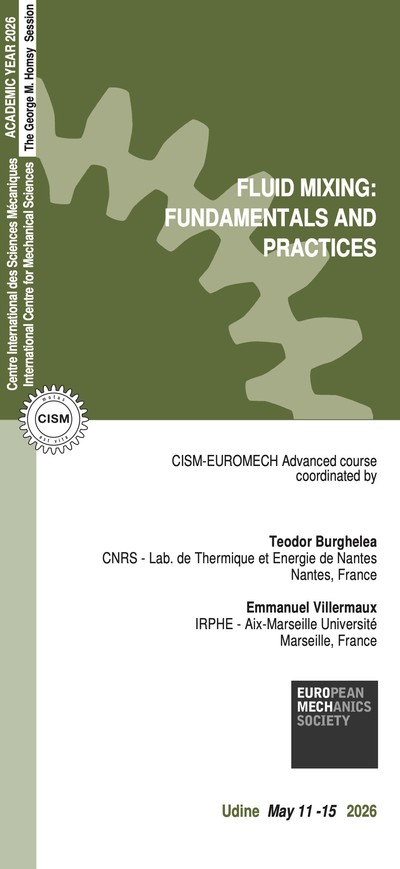A majority of today’s engineering applications can be solved by finite element technologies. Nevertheless, for several important problems, the application of standard numerical simulation techniques, as for example the Galerkin method, is limited due to drawbacks like numerical stability issues, locking phenomena and non-smoothness of the solution. In order to improve capabilities and the reliability of numerical simulations, advanced finite element methods are a major part of today’s research in the field of mechanics and mathematics. Due to the progress in this emerging field the objective of this course is to present new ideas in the framework of novel finite element discretization schemes. Thereby the lectures are focused as well on the mechanical as also on the mathematical background. Here, recent developments in mixed finite element formulations in solid mechanics and on novel techniques for flexible structures at finite deformations will be emphasized. A special focus will aim on the implementation and automation aspects of these technologies. The presented automation processes will pay attention to the application of automatic differentiation technique, combined with the symbolic problem description, automatic code generation and code optimization. The combination of these approaches leads to highly efficient numerical codes, which are fundamental for reliable simulations of complicated engineering problems. The presented modeling techniques cover a huge range of advanced finite element techniques. The special topics of this course are: The isogeometric concept applied to solid and shell structures, novel C1-continuous finite element technologies for Kirchhoff-Love shell models, robust mixed and discontinuous Galerkin methods for solids, plates and shells including strong material anisotropies, flexible body systems considering holonomic and non-holonomic constrains, the Virtual Finite Element Method and concepts of robust preconditioning techniques for large scale problems. Furthermore, the course introduces the theory and application of AceGen: A multi-language and multi-environment tool for highly efficient numerical code generation. These techniques encounter a wide range of applications from elasticity, viscoelasticity, plasticity, and viscoplasticity in classical engineering disciplines, as for instance, civil and mechanical engineering, as well as in modern branches as biomechanics and multiphysics. The course is intended for doctoral and postdoctoral researchers in civil and mechanical engineering, applied mathematics and physics as well as industrial researchers, which are interested in conducting research in the topics of advanced mixed Galerkin FEM, structural finite element methods, mathematical analysis as well as formulations and applications of these methods to finite strain or coupled problems. Through this course, the students can gain a deep insight into interesting discussions, based on the different backgrounds of the lecturers and it is a must for all that are interested and/or involved in advanced finite element technologies. The course is closely related to the Priority Program 1748 "Reliable Simulation Techniques in Solid Mechanics. Development of Non-standard Discretization Methods, Mechanical and Mathematical Analysis" funded by the German Research Foundation.
J.A. Cottrell, T.J.R. Hughes, Y. Bazilevs, Isogeometric Analysis, Wiley, 2009. J. Korelc, Automation of primal and sensitivity analysis of transient coupled problems. Computational Mechanics, 44, pp 631-649, 2009. A.G. Neto, P.M. Pimenta, P. Wriggers, Contact between rolling beams and flat surface, International Journal for Numerical Methods in Engineering 97, pp 683-706, 2014. D. Boffi, F. Brezzi, M. Fortin, Mixed Finite Element Methods and Applications, Springer, 2013. A. Pechstein, J. Schöberl, Tangential-Displacement and Normal-Normal-Stress Continuous Mixed Finite Elements for Elasticity. Math. Models Methods in Appl. Sci, 21, pp 1761-1782, 2011. J. Schröder, N. Viebahn, D. Balzani, P. Wriggers, A novel mixed finite element for finite anisotropic elasticity; the SKA-element. Simplified Kinematics for Anisotropy, Computer Methods in Applied Mechanics and Engineering, 2016 (accepted). P. Wriggers, Nonlinear Finite Element Methods, Springer, 2008. J. Korelc and P. Wriggers, Automation of Finite Element Methods, Springer, 2016.
Fleurianne Bertrand (None)
6 lectures on: the Virtual Finite Element and Mixed Finite Element Methods for large strains based on isotropic and anisotropic polyconvex strain energy functions with and without constraints and the usage of automated approaches.Sven Klinkel (None)
6 lectures on: isogeometric analysis for solids and shells: analysis of solids in boundary representation, collocation methods and Galerkin formulation and appropriate approximations for isogeometric shell formulations.Jože Korelc (None)
6 lectures on: automation of computational modelling: symbolic systems, automatic differentiation, generation of numerical codes, introduction to AceGen, direct and sensitivity analysis of coupled path-dependent problems, ADB formulation of hyperelasticity, finite-strain plasticity and advanced finite element formulations.Paulo de Mattos Pimenta (None)
6 lectures on: different formulations and boundary conditions for geometrically nonlinear beam and shell formulations. Special attention will be given to Kirchhoff-Love shell models, to contact among beams and shells, as well as to flexible body systems.Joachim Schöberl (None)
6 lectures on: mixed variational formulations and their discretization, hybridization and related Discontinuous Galerkin methods and concept of robust preconditioning techniques for large scale problems.Jörg Schröder (None)
6 lectures on: novel finite-element formulations for stable calculations of complex materials in nonlinear applications. A main focus will be on materials with strong anisotropy together with nearly incompressibility.The registration fee is 575.00 Euro + VAT taxes*, where applicable (bank charges are not included). The registration fee includes a complimentary bag, four fixed menu buffet lunches (on Friday upon request), hot beverages, downloadable lecture notes and wi-fi internet access. Applicants must apply at least one month before the beginning of the course. Application forms should be sent on-line through our web site: http://www.cism.it. A message of confirmation will be sent to accepted participants. If you need assistance for registration please contact our secretariat. Applicants may cancel their course registration and receive a full refund by notifying CISM Secretariat in writing (by email) no later than two weeks prior to the start of the course. If cancellation occurs less than two weeks prior to the start of the course, a Euro 50.00 handling fee will be charged. Incorrect payments are subject to Euro 50.00 handling fee. A limited number of participants from universities and research centres who are not supported by their own institutions can be offered board and/or lodging in a reasonably priced hotel or student dormitory, if available. Requests should be sent to CISM Secretariat byJuly 18, 2017 along with the applicant's curriculum and a letter of recommendation by the head of the department or a supervisor confirming that the institute cannot provide funding. Preference will be given to applicants from countries that sponsor CISM. Information about travel and accommodation is available on our web site, or can be mailed upon request.
* Italian VAT is 22%.





